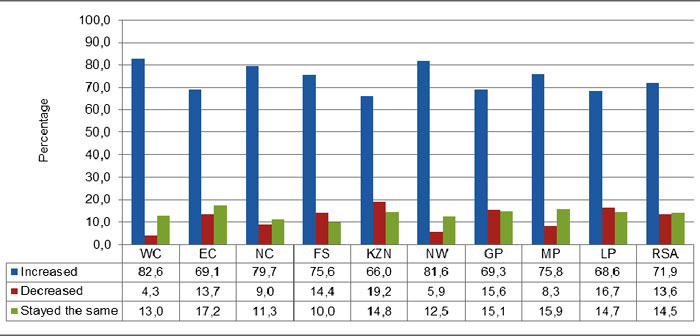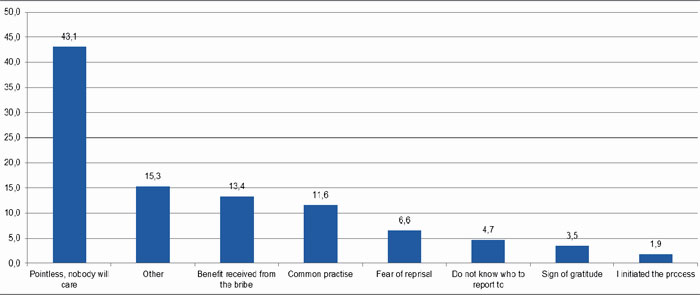|
Getting your Trinity Audio player ready...
|
 A new report released last week by Statistics South Africa (StatsSA) reveals that more than two thirds of South African households believe that corruption has increased during the period 2010 to 2013. However, nearly half of them would not report corruption because they believe it's pointless.
A new report released last week by Statistics South Africa (StatsSA) reveals that more than two thirds of South African households believe that corruption has increased during the period 2010 to 2013. However, nearly half of them would not report corruption because they believe it's pointless.
The report, the 2013/14 Victims of Crime survey, is a countrywide household-based survey and has three main aims:
• to provide information about the dynamics of crime from the perspective of households and the victims of crime;
• to explore public perceptions of the activities of the police, prosecutors, courts and correctional services in the prevention of crime and victimisation;
• to provide complementary data on the level of crime within South Africa in addition to the statistics published annually by the South African Police Service.
The survey is seen as adding to the overall crime picture in the country. It interrogates people’s perceptions and experiences of crime – including corruption – as well as their views regarding their access to, and effectiveness of the police service and the criminal justice system.
All private households in all nine provinces of South Africa, as well as residents in workers’ hostels, were consulted. Other collective living quarters such as students’ hostels, old-age homes, hospitals, prisons and military barracks were not included.
Households still very concerned about corruption
StatsSA asked a number of questions relating to the perceived levels of corruption in the reporting period. These included questions on the reasons people are engaging in corruption and the main reasons they are paying bribes.
It found that only 14.5% of households believe that the level of corruption has remained unchanged during this period, whilst 13.6% say that corruption has decreased. Doing the maths, 71.9% of South African households believe that corruption has worsened.
In geographical terms, the Western Cape, North West and Northern Cape provinces have the highest percentage of households who believe corruption is worse, at 82,6%, 81,6% and 79,7% respectively.
On the other hand, the Western Cape at a mere 4.3% and the North West at 5.9% have the lowest percentage of households who are of the opinion that corruption has decreased over the years.
Get rich quick – main perceived reason for corruption
Households were asked about their perceptions of the reasons that people are engaging in corruption. Their options included: real need, greed, get rich quickly or other reasons.
The report showed that 76.9% of households believe that people are involved in corruption to get rich quickly, followed by greed at 71.2%. Most of these households are located in Gauteng, with the Eastern Cape following.
Some 37.9% of households believe that people pay bribes to speed up procedures, while 23% say it's to get better treatment and 20.6% believe bribes are used to avoid paying traffic fines. A small percentage of households, just 3,5%, think that people pay bribes in order to receive information.

Most corrupt officials are working with social welfare grants, say SA households
Households were also asked for their perceptions about which government officials were most likely to be involved in corruption. They responded by saying that 30% of corrupt officials in their experience work with social welfare grants. Another 13.1% point at the police, and 11.2% name officials involved in housing.
Households were asked if there were any government or public officials who asked for money, favours or gifts while they were expected to render services – the response indicates that households are more likely to be asked for money than any other kind of bribe, with gifts the least likely.
Nobody cares anyway
Asked for their reasons for not reporting corruption, 43.1% of households say that it's pointless for them to report corruption because nobody will care. Another 13.4% are willing to overlook the crime because of the benefit they receive from the bribe, and 11.6% believe it is common practice and therefore does not need to be reported.









